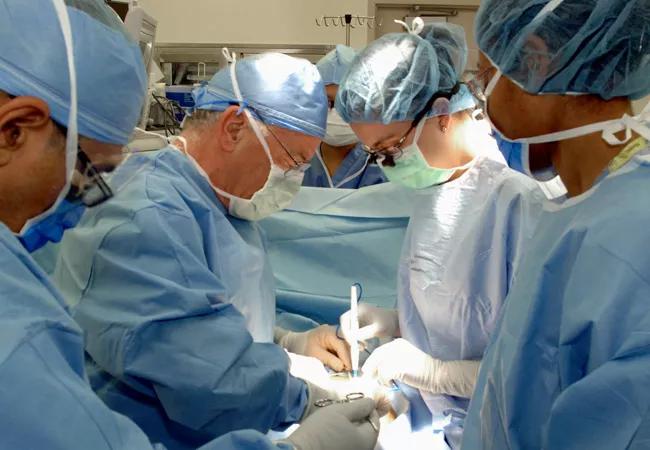Dr. Jason Vanatta takes over as Dr. Andreas Tzakis moves up

When Cleveland Clinic Florida recruited Andreas Tzakis, MD, in 2012 to build an abdominal organ transplant program from scratch, they expected results. The internationally renowned surgeon quickly delivered. In less than six years, he developed a much-lauded program that is poised to become one of the biggest, best and most innovative in the nation.
Advertisement
Cleveland Clinic is a non-profit academic medical center. Advertising on our site helps support our mission. We do not endorse non-Cleveland Clinic products or services. Policy
As Dr. Tzakis transitions to the position of Emeritus Director of Transplantation for the Cleveland Clinic enterprise and hands the reins of the abdominal transplant program to Jason Vanatta, MD, he looks back on his achievements and ahead to exciting plans.
Q: Dr. Tzakis, tell us what you accomplished since arriving at Cleveland Clinic Florida.
A: I was charged with organizing an abdominal organ transplant program and bringing it to national and international standards. I feel my objective has been accomplished. Our kidney program has received the highest rating — five stars — by the Scientific Registry of Transplant Recipients, and our liver program compares favorably with national standards. The hospital expansion, which is now underway, will provide the infrastructure and space we need to grow. In fact, we have recruited two more surgeons to join the staff this year.
Q: What makes your program exceptional?
A: We have a lot of specialists for a hospital with so few beds.I like to say we are the biggest small hospital in the world. Patients are our absolute priority, and they appreciate this. Last year, over 1,100 patients asked to be waitlisted for a kidney transplant, and we transplanted 122 of them. This year, we expect to transplant more than 200.
Q: Why are you moving to a new position?
A: I am looking forward to having more time for research and innovation. My interest in uterine transplantation continues. About two months ago, we did our second uterine transplant in Cleveland. The patient is doing extremely well. We plan to do 10 transplants in the first phase of our study, and so we are continuing to screen patients and put them on the waiting list.
Advertisement
I am also excited about the opportunity to work on combining the transplant programs in Cleveland and Florida into one cohesive Enterprise Transplant Team that allows the staff in both locations to go back and forth as needed to help each other.
This new position does not imply that I will be giving up clinical care entirely. I will continue to operate, and I plan to remain the surgical director of our affiliated liver transplant program at Broward Health [the county’s public hospital system].
Q: Why is Dr. Vanatta the right man to fill your shoes?
A: He had excellent training at Stanford and joined us after spending 10 years as director of liver transplantation at the University of Tennessee at Memphis, which is one of the largest programs in the country. He is a great surgeon, and I was impressed with how he operates. He is also amiable and very well liked. He clearly shares the established values and ethic of the the program we have established: access, superb patient care and hard work. He fully understands and values both team and family.
Q: Dr. Vanatta, what attracted you to take over this program at Cleveland Clinic Florida?
A: The ability to grow this program, which has had remarkable success in the number of transplants and in outcomes in such a short time, was very attractive to me. When you start a new program, you will not be in network for most insurance companies, so you must take on difficult patients and use higher-risk organs. This program was able to do that, and still have better-than-expected outcomes. That’s impressive.
Advertisement
Q: Moving forward, what will your priorities be?
A: I plan to continue growing our programs in kidney and liver transplantation by building the living donor kidney program to larger numbers and, potentially, adding a living donor liver program. We will also start a pancreas transplant program when a new surgeon comes on board this summer. As our volume grows, it will be our responsibility to create a training program to continue training our own best and brightest.
Q: Both you and Dr. Tzakis have said your goal is to build one of the biggest transplant programs in the country. Why emphasize size?
A: There are multiple reasons. First, a big program allows you to help more patients. It brings notoriety, which increases the opportunity to attract more patients for research projects. It also helps develop and sustain new organ transplant programs.
Q: What research directions will you take?
A: I’d like to get more involved in outcomes research. I also hope to get involved in a clinical trial we are doing in Ohio that involves normothermic machine perfusion of donor livers. This process allows the performance of a higher-risk liver to be assessed before it is implanted in a recipient. We will also be doing research on different immune protocols.
You can be assured that if we think of a good idea, we will try to come up with a research program to study it.
Advertisement
Advertisement

Multidisciplinary framework ensures safe weight loss, prevents sarcopenia and enhances adherence

Study reveals key differences between antibiotics, but treatment decisions should still consider patient factors

Key points highlight the critical role of surveillance, as well as opportunities for further advancement in genetic counseling

Potentially cost-effective addition to standard GERD management in post-transplant patients

Findings could help clinicians make more informed decisions about medication recommendations

Insights from Dr. de Buck on his background, colorectal surgery and the future of IBD care

Retrospective analysis looks at data from more than 5000 patients across 40 years

Surgical intervention linked to increased lifespan and reduced complications